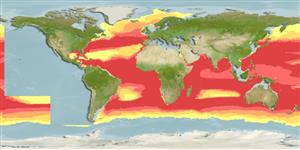Common names from other countries
>
Zeiformes (Dories) >
Parazenidae (Parazen) > Cyttopsinae
Etymology: Cyttopsis: Greek, kyttaros, kytos = a convex cavity + Greek, opsis = appearance.
More on author: Lowe.
Environment: milieu / climate zone / depth range / distribution range
Ecologia
marinhas batipelágico; intervalo de profundidade 150 - 730 m (Ref. 9563), usually 330 - 690 m (Ref. 7251). Deep-water
Western Atlantic: Canada (Ref. 5951) to southeastern USA and northern Gulf of Mexico to western Caribbean (Ref. 7251); northern coast of South America (Ref. 5217). Eastern Atlantic: Bay of Biscay round the South African coast to Natal. Indian Ocean: Somalia (Ref. 30573) and off the south-west coast of India. Western Pacific: off Japan, eastern Australia (Ref. 7300) and New Zealand (Ref. 5755).
Tamanho / Peso / Idade
Maturity: Lm ? range ? - ? cm
Max length : 31.0 cm TL macho/indeterminado; (Ref. 6953); common length : 25.0 cm TL macho/indeterminado; (Ref. 2683)
Espinhos dorsais (total) : 7 - 8; Raios dorsais (total) : 28 - 30; Espinhos anais: 1 - 2; Raios anais : 29 - 30. Rosy pink and silvery in color; pelvic fins reddish with black membranes (Ref. 4253). Mouth large, oblique, highly protrusible; anteriorly directing spine in a series on supraorbital; pelvic fin spine soft, flexible; pelvic fin soft rays long, the longest reaching 5th anal ray when depressed; 1st anal spine large and immovable, 2nd one small and moveable (Ref. 13608).
Occurs on the continental slope (Ref. 75154). Bathypelagic (Ref. 5951). Forms schools. Feeds on other fishes and swimming decapod crustaceans (Ref. 4968).
Ciclo de vida ou comportamento de acasalamento
Maturities | Reprodução | Spawnings | Egg(s) | Fecundities | Larvas
Heemstra, P.C., 1995. Additions and corrections for the 1995 impression. p. v-xv. In M.M. Smith and P.C. Heemstra (eds.) Revised Edition of Smiths' Sea Fishes. Springer-Verlag, Berlin. (Ref. 11228)
Status na Lista Vermelha da UICN (Ref. 130435)
CITES (Ref. 128078)
Not Evaluated
Ameaça para os humanos
Harmless
Uso pelos humanos
Pescarias: espécies comerciais
Ferramentas
Relatórios especiais
Baixar XML
Fontes da internet
Estimates based on models
Preferred temperature (Ref.
115969): 6 - 14.1, mean 9.3 (based on 1039 cells).
Índice de diversidade filogenética (Ref.
82804): PD
50 = 0.8125 [Uniqueness, from 0.5 = low to 2.0 = high].
Bayesian length-weight: a=0.01738 (0.00659 - 0.04586), b=3.00 (2.77 - 3.23), in cm Total Length, based on LWR estimates for this (Sub)family-body shape (Ref.
93245).
Nível Trófico (Ref.
69278): 4.0 ±0.66 se; based on food items.
Fishing Vulnerability (Ref.
59153): Low vulnerability (21 of 100).
